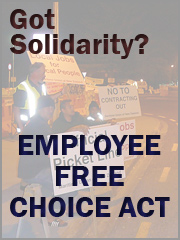While the corporate media are obsessively fanning racist hysteria over Bill Clinton's post-Lewinsky "spiritual adviser," Rev. Wright, the global food problem has become a crisis. Driven by unusual weather caused by global warming, increasing energy costs, increasing demand from India and China, and most of all, overpopulation, food costs are soaring while the incomes of the global poor are not. Secretary-General Ban Ki-moon has focused attention on one of the most pressing issues of our time.
Now comes another blow, seemingly out of the blue. But it is not totally out of the blue. It was known that we predicted even two-three years ago that this crisis would come. I am sorry that the international community had not listened more attentively. That is the challenge of rising food prices that is a crisis for the most vulnerable populations. It threatens to undo all our good work. If not managed properly, it could touch off a cascade of related crises -- affecting trade, economic growth, social progress and even political security around the world.
We are familiar with the causes: rising oil prices, growing global demand, bad trade policies, bad weather, panic buying and speculation, the new craze of biofuels derived from food products and so on and so on. We all know the effect on markets: how the price of basic food stuffs seems to hit new records almost daily, how the price of rice, in particular, has gone from $400 a ton some weeks ago, to now $1000 a ton.
Think of the impact on ordinary people. Even in Europe and the United States, consumers are grumbling. But imagine the situation of those living on $1 a day, who might spend two thirds of their income on food.
In Liberia last week, I heard how people have stopped purchasing imported rice by the bag. Instead, they increasingly buy it by the cup -- because that’s all they can afford. It is worth remembering that Liberia’s descent into chaos began, in 1979, with food riots.
In Côte d’Ivoire, political leaders told me how they worry about that the crisis in food could create social unrest and undermine their efforts to build real democracy -- at a time when they are so close to success.
In Burkina Faso, the President told me how desperately the nation needs help, where so many people live on simply $1 a day or less. One senior Government official spoke to me especially forcefully. The crisis in food, he said, is a greater threat by far than terrorism. “It makes people doubt their dignity as men,” he said. And he added: “The issues of hunger and survival and how to live have become burning issues for the international community.”
He is calling for immediate action:
First, we must feed the hungry people.
Together, we call on the international community to urgently and fully fund the emergency requirements of the World Food Programme (WFP). Those requirements currently stand at $755 million, and they will inevitably grow in the future. Without this emergency relief, we will see a sharp rise in hunger, malnutrition and disease around the globe. We will see increased social tension and economic decline.
What is Bush doing? He's drooling over all the money his investments are accumulating from war profiteering companies leeching off of the Iraq catastrophe. He doesn't have time to care about people making $1 a day. In fact, if he could take away half of that for himself and his rich friends, he would delight in doing so.











What a good post Libhomo..I can think of nothing to add, you hit all the marks.
The third world nations are suffering the worst..which means the big rich countries pay little attention, those countries are expendable..